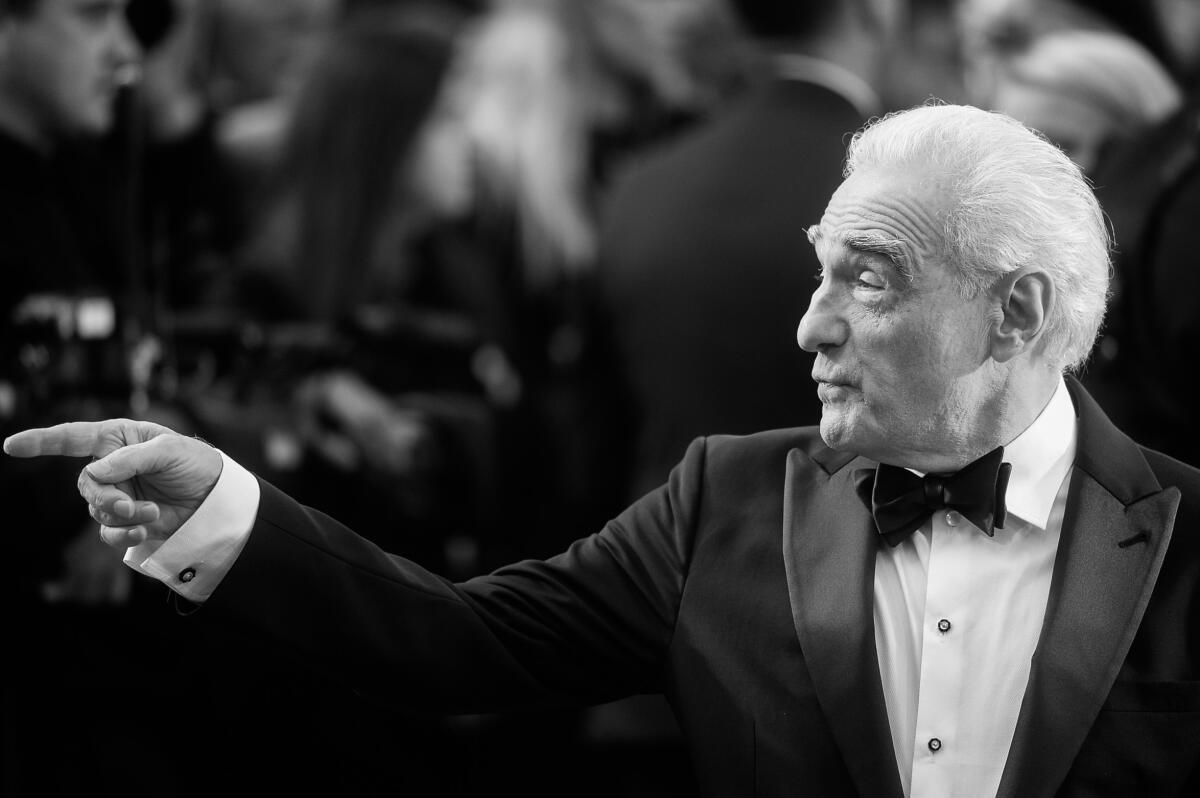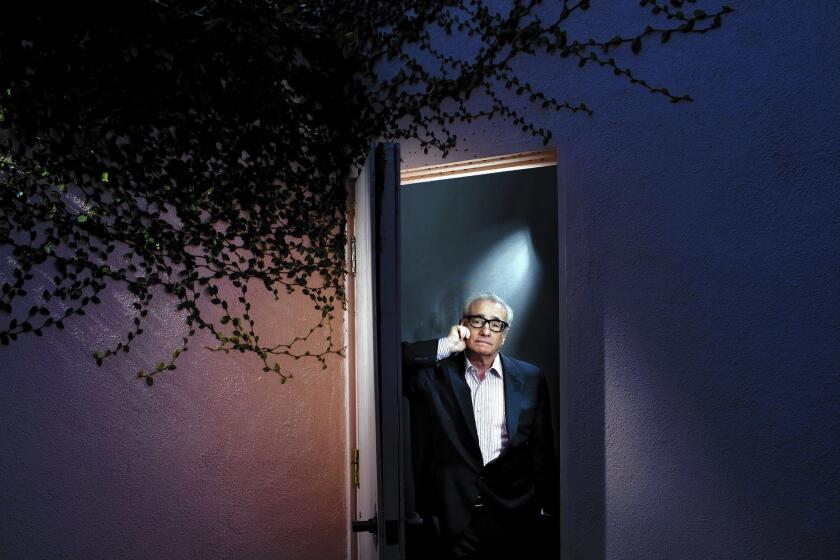‘The Irishman’ is now on Netflix. And Martin Scorsese has a few more things to say
- Share via
Martin Scorsese’s “The Irishman,” which has had a limited run in theaters, begins streaming on Netflix on Wednesday. The epic film’s arrival ends a decade-long odyssey that brought a master filmmaker into the fold of a platform that is redefining cinema in an age of small screens and shifting entertainment alliances.
“The Irishman” opened in movie houses Nov. 1, but as part of a deal between Scorsese and Netflix, the $160-million film did not receive the expanded theatrical run of many big studio pictures. Like the Oscar-winning “Roma” and Noah Baumbach’s “Marriage Story,” which Netflix also distributed, “The Irishman” is another indication of the Hollywood outsider’s strategy to attract acclaimed directors, actors and writers to its global streaming service.
Based on the life of Frank Sheeran (Robert De Niro), a mob hitman who claims to have killed Teamsters union leader Jimmy Hoffa (Al Pacino), the three-and-a-half-hour film has earned Scorsese some of the best reviews of his career. It is a tale of organized crime, labor, greed, politicians, murder and the bonds of illicit men who age, die and drift into obscurity. It plays as if a metaphor for what was known as the American Century, which stretched from World War II to the new millennium.
“With all the flash and all the spectacle gone, what’s left?” Scorsese said in an interview last month, ahead of the film’s theatrical release. He was speaking about where Sheeran finds himself late in life — the colorful details of which are chronicled in Charles Brandt’s book “I Heard You Paint Houses,” a euphemism for murder. “For me, it’s hard to put into words. You take that world and you strip it away and you’re left with individual existence. Frank’s there (in a nursing home). He’s reflecting. I like to think he gets his soul back somehow.”

Scorsese is an impassioned cinephile whose influences include Roberto Rossellini, Federico Fellini, Sam Peckinpah and John Cassavetes. In the build up to the opening of “The Irishman,” the director harked back to earlier days of filmmaking, igniting social media fury and backlash for suggesting that Marvel movies — which dominate the box office and a significant amount of film coverage and discussion — were more amusement park ride than cinema. They are a fleeting thrill, said Scorsese, with little reverence for the complexity of human nature.
Many Marvel fans, a handful of filmmakers and even Disney Chief Executive Bob Iger took umbrage with the characterization. But his comments read as an auteur frustrated by studio formulas and the realities of the box office; a classic case, in his mind, of art being sacrificed to commerce.
In the interview, he pointed to Alfred Hitchcock, a filmmaker with an eye for showmanship and marketing, as an example of a director who made popular mysteries and thrillers without sacrificing a keen understanding of what made his characters complete.
Martin Scorsese’s “The Irishman” — a much-hyped, three-and-a-half-hour Mafia world epic for Netflix — is a complete triumph.
“Hitchcock played the audience like an orchestra,” said Scorsese. “ ‘The Birds.’ ‘Strangers on a Train.’ The thing is, with the Hitchcock pictures, you can go back 10 years, 20 years later, and they’re still rich. Some are better than others. ‘Rear Window’ stands up more than ‘To Catch a Thief.’ ‘Psycho’ remains. What’s interesting about ‘Psycho’ is that the murder scenes, all that incredible editing, still hold up. But that’s not the most interesting stuff. All the dialogue, all the angles, the use of music, the looks on the faces of the actors, the framing. That has a resonance. It’s about people.”
Small screens, virtual reality, multiple dimensions and computer graphics are reconfiguring how films are made. Scorsese is not immune; he used an expensive a “de-aging” technique in flashbacks to make his actors look younger in “The Irishman.” But, he said, technology, in the end, must serve our deep-seated desire to tell and listen to stories about who we are.
“You can’t stop the creative impulse of young people wanting to tell stories, whether it’s writing, painting, music, theater,” he said. “They’re going to do it, and I think the reaction is stripping it all away and going back to the human being. The storyteller.”
“The Irishman,” which is a heavy awards season contender, is a celebration of that creed.
Written by Steven Zaillian, the film, which is estimated to have grossed more than $4 million at the box office (Netflix does not release official numbers), is about the duplicitous and the corrupt. It centers on the relationships and loyalties of wise guys. But it is a glimpse of America’s sins and foibles from President Kennedy’s failed Bay of Pigs invasion in Cuba to the rise of Richard Nixon and Watergate. News reels of this history play through the film, leading one to contemplate President Trump and our current political moment of lies, impeachment inquiries, Russian spies and betrayed allies that have challenged our ideals and shaken our democracy.
“The point is [democracy] is always in progress, and now we’re having our biggest test since the Civil War. The world is constantly being tested on how we should live,” said Scorsese. “I go back to ancient Greece. You had Plato and Dionysius in Syracuse. Dionysius was this terrible tyrant, but he brought Plato over because Plato was talking about the philosopher king. He was going to teach Dionysius. But Dionysius wound up arresting Plato. He sent him off to be a slave. It didn’t work.”
From “Taxi Driver” to “The Irishman,” Martin Scorsese has created indelible films for the American imagination. He’s not done just yet.
He added: “It makes us reflect on what we’re supposed to be. This document called the Constitution. Now, we’re all getting a real education.”
Scorsese has spent much of his life looking into dark hearts and examining the avenues of violence, power and greed. From “Goodfellas” to “The Wolf of Wall Street,” his characters have not always found redemption, but in them, we have seen glimmers of ourselves.
”I wanted to witness that process with him by the last half hour of the picture,” he said of Sheeran in “The Irishman.” “Coming to our own reckoning that we all have to do, if we’re given the time. That’s the price he had to pay. Ultimately, God forgives him, but does he forgive himself. I think that’s the dilemma for most people.”
More to Read
Only good movies
Get the Indie Focus newsletter, Mark Olsen's weekly guide to the world of cinema.
You may occasionally receive promotional content from the Los Angeles Times.








